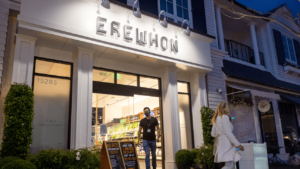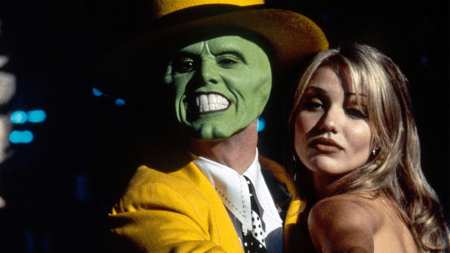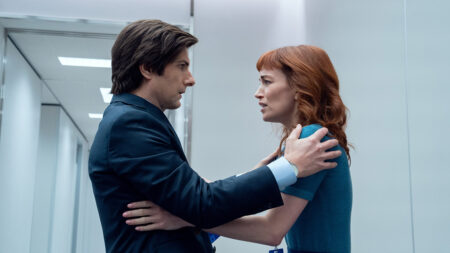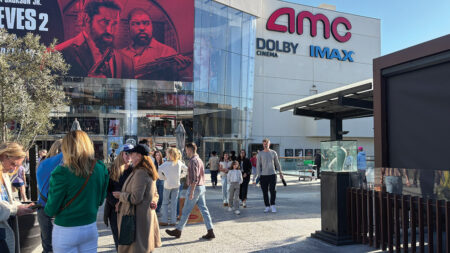[This story contains major spoilers from the season seven finale of Outlander, “A Hundred Thousand Angels.”]
In seven seasons of Outlander, Claire (Caitríona Balfe) and Jamie Fraser (Sam Heughan) have endured enough trauma to last multiple lifetimes. While they have always found their way back to each other and the family they’ve created together across centuries, Claire and Jamie, now in middle age, are perhaps more aware than ever about what they stand to lose.
“Jamie is very much aware of his mortality. He’s talked about it multiple seasons, about his nine lives, and he’s right at the end of them,” Heughan tells The Hollywood Reporter in a joint interview with Balfe about the season seven ending. “He didn’t want to be involved in this [Revolutionary War], but his choice now is that he has to be involved to protect those he loves. I think [Jamie and Claire] are aware that they can’t exist without each other and they’d rather not. So what does that mean for the future? I think if one loses the other, then I don’t know if there’s much hope for them.”
Despite that bleak outlook, Claire and Jamie have reason to be hopeful heading into the eighth and final season of the fantasy historical drama. In the season seven finale, as Claire recovers from being shot again and undergoing a life-saving surgery at the hands of Denzell (Joey Phillips), she and Jamie discover that their first daughter Faith, who they believed died in childbirth, had actually survived and was the mother of their new ward Fanny Pocock (Florie Wilkinson) and her late sister Jane (Silvia Presente), who Jamie and his biological son William (Charles Vandervaart) were tragically unable to save from captivity just days earlier.
That shocking cliffhanger — which was not in Diana Gabaldon’s Outlander novels — sets up the final 10 episodes, which Balfe and Heughan have already finished filming. Given that the show has remained a constant in their lives for 11 years, the actors, who both became producers during the fifth season, admit they are still in the early stages of grieving that loss and figuring out how to fill that new void.
“I’m reading a lot, I’m writing a bit, I’m watching so many movies at the moment — all of these things that I just didn’t have time to do,” Balfe says. “I feel like as an actor, when you’re working, you’re on output mode all the time, and it’s so important to feed your soul as well. I want to take my time, wait and do things that really mean something to me.”
Below, the actors behind one of the most beloved TV couples of all time open up to THR about the evolution of their onscreen and offscreen relationships, how they chose to play the key moments from the latest chapter of Claire and Jamie’s love story — and the one genre they would love to collaborate on in the future.
***
Having played Claire and Jamie for over a decade, what new layers were you able to find in the playing of these characters in the seventh season?
SAM HEUGHAN Jamie’s gone from being this tempestuous, impetuous highland warrior with very little responsibility to becoming a laird, and now he’s responsible for not just his men in battle, but everyone on Fraser’s Ridge. He’s essentially a landlord or a clansman. But what I think is really interesting as well is that over the past couple of seasons — but this one in particular — Jamie realizes what he’s got to lose. I think now he realizes he can’t have a life without Claire; he knows that life isn’t worth living without her. I guess being more fragile is what’s interesting about him, which I think comes with old age as well. He’s not as hotheaded, he’s definitely more experienced, and with age comes perhaps more insight into mortality.
CAITRÍONA BALFE Seasons five and six were such a huge shift in who Claire was. Going through the attack and then the ether storyline, it wasn’t like [she became] two different people, but Claire’s whole structure and her coping mechanisms had to change. In season seven, it was this tentative rebuilding of who she was, which was really interesting because I feel like up until that point, there was a lot of compartmentalization — she would do things, but it was put away in a box and she wouldn’t really deal with it. In season seven, there was a maturity to her, but it came with this new layer of vulnerability, especially the beginning of the second part. I think it just made everything much more porous and much more fragile.
As you’ve played these characters from their earlier adult years into middle age, how have you found ways to deepen the palpable sense of intimacy and chemistry between them?
BALFE One of the things that Sam and I were very interested in working out and exploring was this difference in intimacy. People talk about the passion of Claire and Jamie, and that is always a through line, but it can’t feel like those first throes of lust. You want to find something that has more depth, more maturity and more nuance. So we didn’t want to be chasing something that we had done in season one; we didn’t want to be always trying to replicate that. We wanted to find new ways of doing it — and we did.
We had those conversations for most of the sex scenes, and we had chats with the writers about how to find those intimate moments when they’re in conversation and when we see them working out issues in their marriage. It was really important to us to develop that as the seasons went on because sometimes, there’s a call from the fans, and they want to see those sex scenes, and they want the passion. And we want to give you that, but we want to give it to you in a more honest way.
HEUGHAN I think you’re absolutely right. Over the years, they’ve both had to accept each other and their failings, and all these things that have happened either together or separately. And it can’t be like season one because XYZ has happened, so therefore, who’s this character? Who’s this person in front of you now? If anything, they’ve become more understanding of each other, and I think that comes with just playing these characters over time when they’ve been assaulted and lost and found each other again.
BALFE There was a vulnerability to them in the beginning because everything was so new and they didn’t know if they could trust each other. As we were in the mid-seasons, it felt like they had really come into their own — and there was a strength. In the later seasons, there was this new and very different vulnerability. With the precariousness of life that they were experiencing, there was this whole new set of fears and vulnerabilities that came up. That wasn’t something that I expected or imagined would happen, but it naturally happened that way.
Caitríona, grief is already a tricky emotion to play, but you had the added challenge of having to make the audience believe, even if for a little bit, that Claire had really lost Jamie in episode 10. How did you want to play the different stages of her grief?
BALFE It was really tough, because I feel like there is that sense of, “Does anyone really believe that Jamie Fraser is dead?” But you have to go for it. I had just lost my dad, so the last thing I wanted to do was go into work and feel these feelings. It was not my favorite couple of weeks at work. I worked really hard with the writers to craft a bit of a journey, and there was that [line] that I held on to as well: “I would know [if he died]. I would feel it.” She feels betrayed by herself because she feels like it should feel differently. So there’s the anger and the disbelief that comes with what it feels like when you can’t even trust your own emotions.
And then, of course, the added implication of Lord John Grey [David Berry] was a curveball. (Laughs) David Berry was an amazing scene partner in those scenes. To do intimate scenes with somebody other than Sam — usually all my stuff is with him, so it was like an added unknown territory. But what was also good was we approached it in a very different way to how Sam and I approached things. Sam and I have this shorthand — it’s very organic, and we don’t have to plan out things as much — whereas David likes to [plan]. I’m glad he did because I was quite lost about how we were going to achieve it, but I think in the end it worked quite well.
Claire’s grief-stricken hook-up with John — during which they were both picturing Jamie — has to be one of the most shocking moments of the series. How did you justify Claire’s actions in that moment for yourself?
BALFE I suffer from a real need for things to be logical, which drives the writers crazy, because for me to be able to play it, I need to be able to understand the journey. I think in the final edit, things are quite cut up and it’s not as linear as how we played it. But I think it was great that David and I found a linear journey into it so we could understand that [moment], because it’s also two people who are drunk.
When you’re drunk, there isn’t always logic, but there has to be those moments of, how do you get from A to B? How do these two people who aren’t sexually attracted to each other, who don’t have a history together, go from being alone, drunk and in pain to then being together? So it was finding that shared pain, that shared anger. Lord John was almost needing this kind of consolation in the beginning, and then it’s just the anger and the passion — and it had to come out in some way. So that’s how it happened.
But I think that morning after scene — that gorgeous story that Lord John had and the insight into his life — is so much more intimate than the stuff before. The intimacy the next morning is where you really see these two people form this bond that isn’t sexual, but it’s a friendship and a deep understanding of each other, which I thought was quite beautiful.
In episode 12, Jamie makes his feelings about Claire and John’s entanglement clear in a long, heated sequence where Jamie and Claire are working through their own emotions in real time. How did you each approach that fight?
BALFE Well, Sam had COVID. Do you remember? (Laughs)
HEUGHAN Yeah! It was certainly very challenging. In some ways, it was [shot] like a play, but I think we shot one direction, then I came down with COVID. I think quite some time later we shot the rest of it, and we shot it in two sections because it moves all around the house. I suppose [that sequence shows] why this couple are still together. They manage to work through it, to hear each other and to communicate despite Jamie’s stubbornness, anger and jealousy.
BALFE But neither are wrong, really. This was a situation that is so unusual and unique, so it’s totally understandable why Jamie would be so upset and angry, but it’s also totally understandable why Claire would defend herself. I think what’s great is you get this tension of these two people who ultimately love each other so much, but they’re going to stand their ground. I think both Sam and I relish when we do get to do scenes like this. There’s certain days when you’re on a show and you’re just sitting at a table and somebody’s passing somebody coffee, and it doesn’t necessarily feel like the most rewarding acting day. But when you get big scenes like this, you really feel like you have to work hard, give it your all, and make it work.
Sam, do you think Jamie could ever bring himself to forgive John?
HEUGHAN I think what Jamie did [to John upon learning what happened] — is it justifiable? No, from [the viewers’] point of view. But for Jamie, probably. But what he did to him is horrific and certainly has broken their bond. John Grey comes back and does justify it, and I think we hope that they will become friends again, but I think it’d be a lot for them to get over. Jamie is going to have to admit his wrongdoing, and I think that’s probably the hardest thing for Jamie to do. It’s certainly put a rift in that relationship, and I’m sure for Claire and John Grey as well, it’s also a pretty weird situation. (Laughs)
In episode 15, Claire gets shot in the battlefield and Jamie desperately searches for any kind of way to save her. Sam, how did you want to play Jamie’s inner turmoil?
HEUGHAN Jamie has always been in control in situations, and I thought it was really interesting in the script that he loses it and he’s lashing out. I think the only other time where we’ve seen him like that is when he lost Murtaugh at the Battle of Alamance. I think that moment was close because Murtaugh was his godfather, a father figure to him, but this is even bigger. It’s like, “How do you react in that moment when your universe has just imploded?” I didn’t want to plan it; I just wanted to go for it and see what happens. I think what’s cool about the writing and the space I got in the performance was that he’s not Jamie. He’s out of control, and he’s pleading with everyone, with God. He knows he’s on the edge of losing his entire universe.
How did you react, then, to Jamie’s decision to write his notice of resignation using Claire’s blood on the back of one of his soldiers?
HEUGHAN Look, it’s a really hard one to get your head around. It’s a book moment, and even in discussing the practicality of that [moment], we were talking about “What is the way to write on this guy’s back?” and we realized it’s actually very difficult. But I think it’s just sheer desperation; it’s a moment where he’s completely at a loss. I think he can’t work out how to get his message through to these people, and he just goes for the nearest thing. It’s a really dark idea. It’s amazing that after eight seasons — well, seven at this point — that these characters still surprised us as actors, and there’s so many times we’ve had these book moments where I’m like, “Jamie wouldn’t do that. Jamie knows better.” And then, I’m like, “OK, let’s see what happens.” And actually, you get this really dramatic moment which is shocking, and I think that’s what makes Outlander perhaps still resonate.
Caitríona, on the flip side, what was it like for you to play the aftermath of Claire getting shot?
BALFE It was very funny because they were very concerned about how comfortable I would be lying down for that long, and I was like, “Guys, I’m going to be lying down. It’s going to be very comfortable!” But they made a prosthetic for my stomach so they could do the operation. Look, I’ve never been shot. You can watch things, but sometimes we joke about it, like, “Am I just playing my version of what I’ve seen other actors do in movies?” (Laughs.) But you have to trust the director and everything that’s going on in the scene and go with it. I’m not going to lie: I don’t mind playing sick and half-dying. (Laughs.) You get to let other people do all the hard work, and you just get to lie there and moan a bit. But the set was amazing. When you have all of those things around — and Sam was incredible in those scenes — it makes your job very easy.
After they’re unable to save Jane in the finale, William has a heated confrontation with Jamie about William’s late birth mother, and William ends the conversation with the line, “I will never call you father.” The hurt on Jamie’s face is obvious, but what is going through Jamie’s mind in that scene?
HEUGHAN Jamie’s never been able to be a father to William, and I think he’s always wanted to be — from a distance. Here’s a moment where Jamie doesn’t really know how to be a father. He’s been a father to other people. He’s got so many surrogate sons — from Fergus to a bunch of people that he’s brought into this extended family that he’s got — but with William, it’s a really tough one. I think it’s great because you can see Jamie and his son are very similar; they both have that fire in them. And without giving away spoilers, it’s definitely something that plays out a lot [going forward].
But it’s also interesting because he is John Grey’s son in a lot of ways. He’s been brought up by John Grey, and that adds another dimension to that trio’s relationship. Jamie has all this pride, hurt and longing that he could be [Jamie’s] father, and also jealousy that John has been his father but also thankful [at the same time]. Certainly, it’s going to be a tough one for [Jamie and William] to both overcome their pride.
In the final scene, Claire overhears Fanny singing “I Do Like to Be Beside the Seaside,” a 19th-century song Claire sang to her and Jamie’s first daughter, Faith. After learning that Fanny and Jane’s mother was also named Faith, Claire now believes that Faith wasn’t actually stillborn and had somehow lived to have children of her own. How does that set up their journey in the final season?
HEUGHAN It’s a huge moment for them to find out that their daughter potentially lived, and now they have this grandchild in their life. It’s a great cliffhanger — one that I think book and non-book fans are going to be surprised by. I think it was beautifully done with the song. It’s interesting because even playing [Faith’s death] way back in season two, we played the truth of it; we had no idea ourselves. So it was a shock for us as actors reading it and learning about it, as it was for the characters. I think the thought process for Jamie is, “How is it possible?” The elation, the happiness that, actually, it could be possible. And then, who is this young girl in front of us right now?
BALFE I just love it when you are given a scene and you read it, and it’s like, “Ooh, that’s really good.” But in the playing of it, when the hairs on your arms are standing up, it’s pretty brilliant. Florrie is so amazing. Every time we have a scene with her, you’re just so blown away by how brilliant she is. It’s such an interesting cliffhanger because it just opens up this whole other world of questions, which leads us so brilliantly into the next season. I think for Claire, it’s like her heart stops, her heart breaks and her heart sings — all at the same time.
You’ve seen each other through just about everything in the 11 years that you’ve worked together. Looking back, how has your working relationship evolved over time, and what do you think has stayed the same?
HEUGHAN (Laughs) That’s a cool question!
BALFE Well, I think our childish sense of humor has stayed the same.
HEUGHAN I was going to say our humor, silliness. When we’re in the shit and it’s a tough day, or we’re in the dark and it’s cold, we’ve always had each other. I’m very fortunate to have spent so much time with such an amazing person and also managed to laugh a lot as well. But what’s changed, Cait?
BALFE I think when we first started, the job was our lives. We lived it, breathed it. Our schedules were so insane. We really didn’t do much of anything else. I think as we’ve gotten older, our lives have gotten so much busier and you have obviously a wealth of experience to fall back on with your character. So it’s not that we’re not as invested as much, but the show isn’t just the only thing going on. I think, in that way, maybe our approach to things is slightly different. Would you agree, Sam, or no?
HEUGHAN Yeah. It’s not sustainable to be all-consumed by something for that long, but in some ways, perhaps having a bit more space or a life outside of it, it also influences the work itself. We’ve just both grown over time, and I guess it’s depressing but also an amazing opportunity that we’ve got to live with these characters for so long.
What would it take, then, for the two of you to work together again? Maybe in a more modern story without wigs or period costumes?
BALFE I’d love to do a comedy with Sam.
HEUGHAN Yeah, that would be a lot of fun. And as you said, yeah, no wig. Well, actually —
BALFE The wigs would be alright. No corset for me.
HEUGHAN I’d wear a corset, so maybe there’s the comedy right there.
BALFE I’ll wear your wig. There you go!
***
All seven seasons of Outlander are now streaming on Starz.
Read the full article here
















